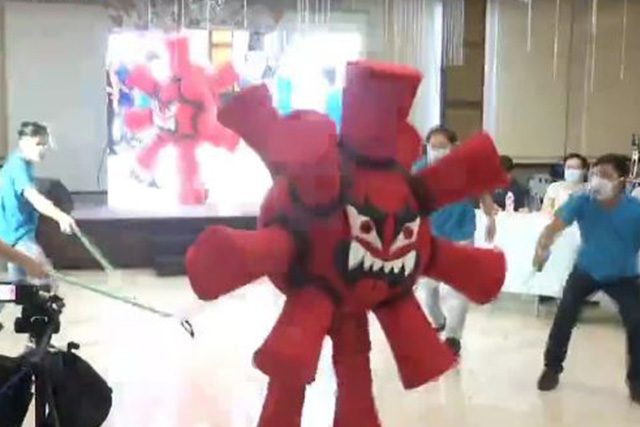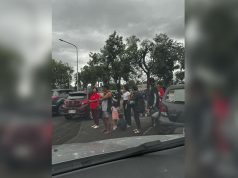
A state-run news agency tagged a Facebook post satirizing a viral video featuring a virus mascot as “fake news,” despite its foremost intention to be interpreted as a parody.
Philippine News Agency (PNA) on Sunday denounced the edited clip of a video uploaded on a Facebook group dedicated to satirical memes and tagged it as a form of “disinformation.”
“A clip from an IATF-EID Meeting in Laguna on August 15, 2020 has been altered and has been circulating,” PNA said on Facebook.
It mentioned that the original clip featured the launching of an initiative done by San Pablo City, Laguna as safety measures to combat the COVID-19 pandemic on a community level.
The initiative that was featured in the 30 minute-mark of the original video involved the use of the “distancing stick” to ensure that the residents will observe physical distancing in public.
People are advised to stay at least one meter away from each other, although the health department highly recommends two to three meters away for maximum safety measures.
The initiative of San Pablo City’s local government unit was presented to members of the National Task Force (NTF) Against COVID-19 and the Coordinated Operations to Defeat Epidemic (CODE) Team on August 15 to discuss strategies on mitigating the spread of the coronavirus.
Laguna has the highest number of coronavirus cases in the CALABARZON Region. As of August 16, it has 3,644 COVID-positive patients in the province.
“This is no laughing matter, hence possible measures to help mitigate the spread of the virus are welcome,” the PNA said in a Facebook post in response to the edited video clip.
“Apparently, malicious parties have altered the video, changing the anti-COVID jingle into a tourism jingle. THIS IS FAKE,” it added.
The agency also urged the public to be “mindful” of the content they share online and make sure that it comes from official and reliable sources.
FAKE NEWS: A clip from an IATF-EID Meeting in Laguna on August 15, 2020 has been altered and has been…
Posted by Philippine News Agency on Saturday, August 15, 2020
‘More fun in land of COVID-19’
Over the weekend, an edited version of the video clip was uploaded on Facebook meme group “Malacañang Meme Commission Emergency Bunker” which involved a piece of altered music as background.
Instead of using the original jingle which focused on combatting the coronavirus, the edited clip featured the official jingle of the tourism department’s “It’s More Fun in the Philippines” campaign in 2012.
The edited video had the caption:
Filipinos: MASS TESTING NOW!
PH Government: It’sMoreFunInTheLand_of_Covid19.mp4
It featured the phrase used by a Thailand newspaper which referred to the Philippines as the “land of COVID-19.”
As of August 16, the Philippines has the most number of coronavirus cases in Southeast Asia, based on science organization Earth Shaker Philippines.
The edited clip made rounds on social media as some Filipinos criticized the use of resources on a performance instead of supposedly directly allocating it for use of “public health.”
what that achieved in terms of public health: https://t.co/J0cPQMofqT pic.twitter.com/5ezQTFIHa0
— jennai⁷ #MassTestingNowPH (@ElyssJennai) August 15, 2020
“Poor use of public funds..” wrote another Twitter user in response to the video.
“They have the audacity to fund this stupid cosplay instead of taking serious matters in their own hands?” commented another online user.
No originality?
Meanwhile, others noted that the mascot featured in the San Pablo event resembles Thailand’s novel coronavirus mascot called “COVID-kun.”
“Ronalyn of San Pablo City wala kang originality. Binuhos mo lang budget mo sa goth make-up,” a parody account of Pami, the Southeast Asian games mascot, commented on Twitter.
COVID-kun was reportedly launched in March to teach kids how to properly wash their hands and practice social distancing.
Of dancing and memes
Presidential spokesperson Harry Roque previously remarked that they would just “dance off” the worsening coronavirus situation in the country but clarified that it was not meant to be taken literally.
The Palace official in July was asked about the government’s plan as Metro Manila and some regions shift or extend to general community quarantine that period.
Part of his answer involved “dancing off” the coronavirus.
“Some will say kinakailangan nating sayawan ang COVID-19. Kasi sa Pilipino, when you have to live with something, sayawan mo na lang pero… iyan po ang gagawin natin. Sasayawan po natin, we have to deal with COVID-19; we have to resume with our economy; and at the same time, protect our people,” Roque said.
He later on said that it was part of the “Hammer-and-Dance Theory” which referred to the government’s decisions on quarantine period and the approach after transmission rates have slowed down.
READ: The ‘hammer and dance’ theory vs coronavirus, according to Harry Roque
Meanwhile, it was not the first time that satirical posts have caught the government’s attention.
Last year, former presidential spokesperon Salvador Panelo denounced a meme showing him endorsing opposition senatorial candidates.
Spokesperson Celine Pialago of the Metro Manila Development Authority also filed cyber libel charges against the uploader of a satirical post involving her.
“Meme” is defined as an “amusing or interesting item (such as a captioned picture or video) or genre of items that is spread widely online especially through social media,” according to Merriam-Webster.
Anushka Kulkarni, a professor at Amity University, said in a 2017 paper that memes “are mediums that communicate information through humor and satire,” including political satire.
The Supreme Court in 2015 ruling said that satire is a protected speech under the 1987 Philippine Constitution, specifically under Section 4 of the Bill of Rights which states that no law shall be passed abridging the freedom of speech, of expression or of the press.









